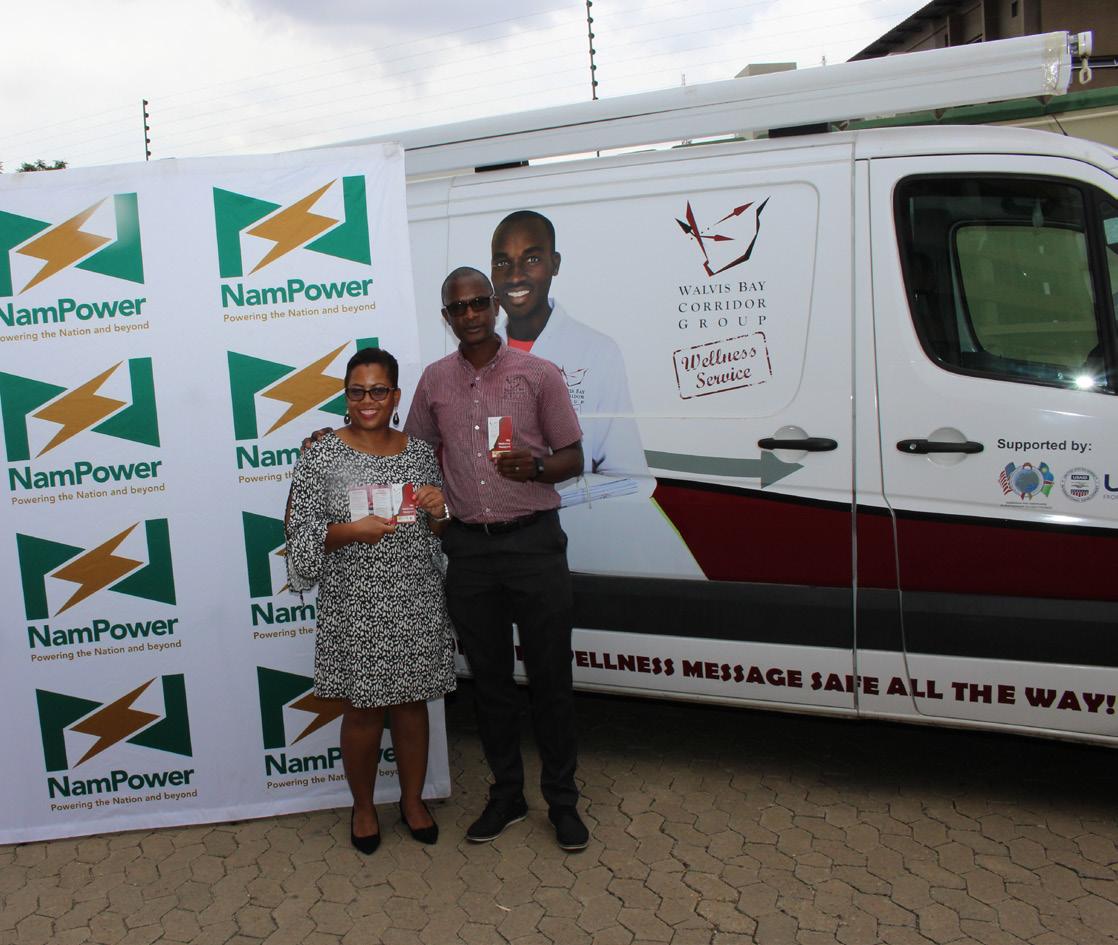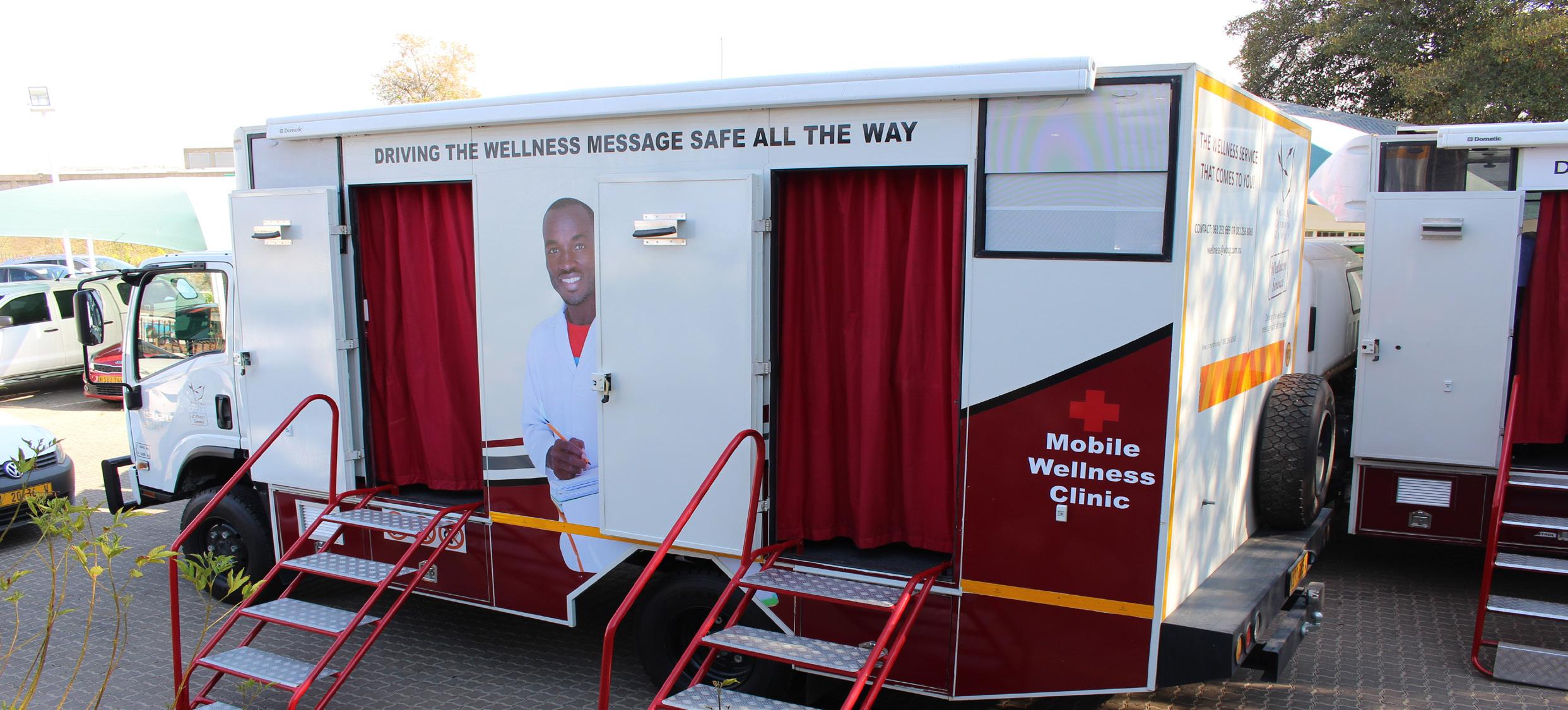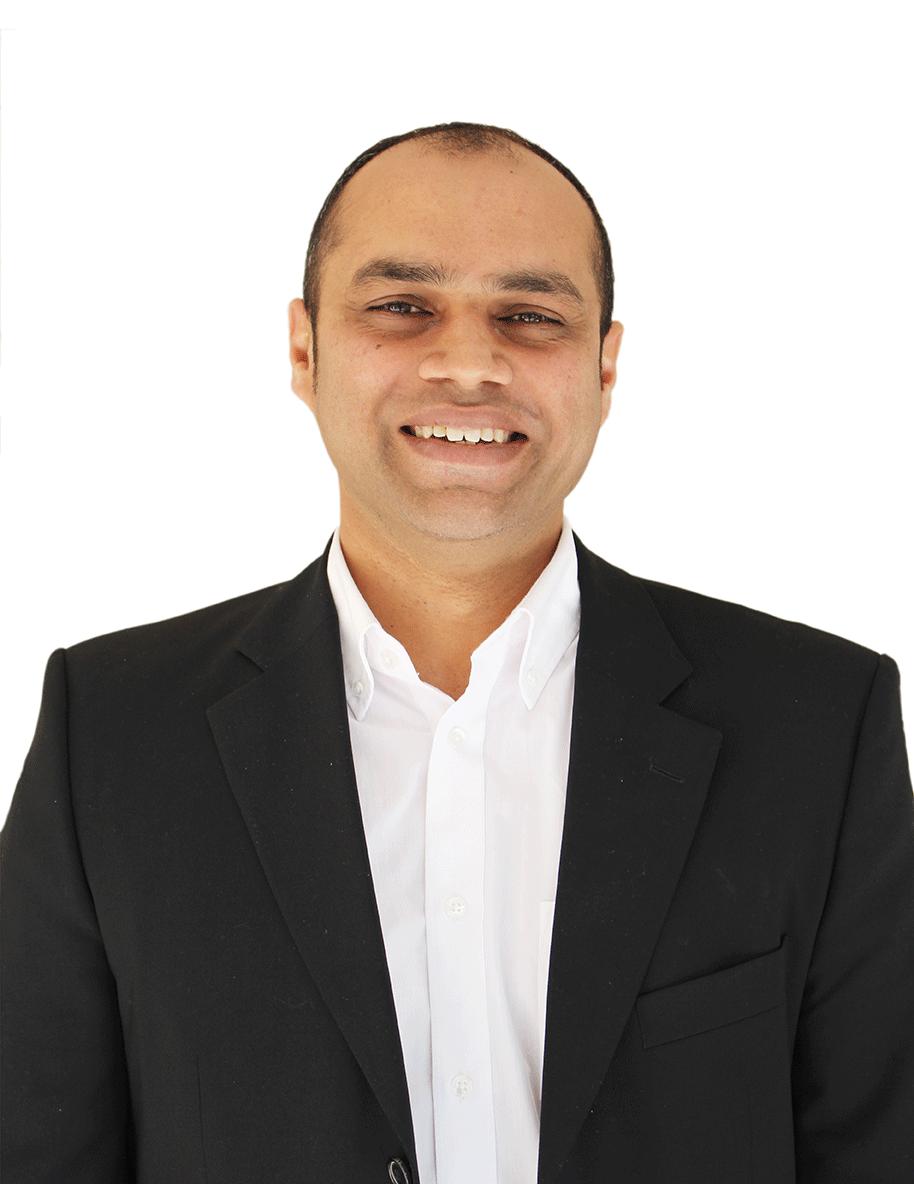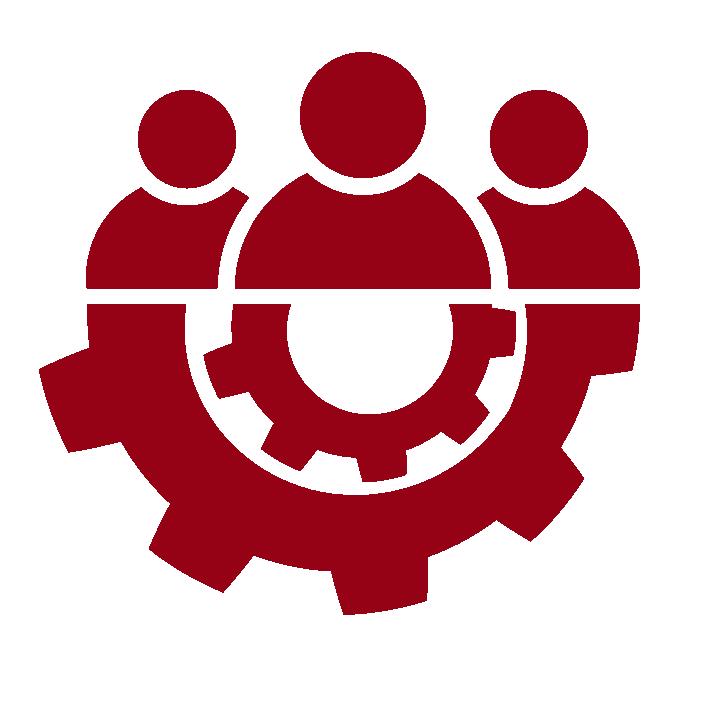
10 minute read
ServiceWellness
SPECIAL PROJECTS
WELLNESS SERVICE
Advertisement
Edward Shivute Project Manager: Wellness Service
OVERVIEW OF THE HEALTH SECTOR IN NAMIBIA
In Namibia, the scourge of HIV/AIDS remains one of the most devasting diseases and continues to threaten socio-economic growth and loss of life in many sectors. The Ministry of Health and Social Services and other stakeholders including the Walvis Bay Corridor Group (WBCG) are in the process of implementing the National Strategic Framework (NSF) on HIV/AIDS response in Namibia (2017/182021/22) to guide planning, programming and implementation of the national multi-sectoral and decentralised HIV and AIDS response. The design of the NSF is premised on the Investment Framework and Results-Based Management (RBM) approaches. The framework is catalytic, supporting delivery of innovation and best practices, necessary to ensure provision and sustainability of a quality and comprehensive HIV response. The key NSF message is to do “better and more of the right things at the right time and at the right scale” during the implementation.
PROJECT OVERVIEW
The WBCG continues to contribute significantly to the outcome results of this framework by implementing strategic and sustainable comprehensive health and wellness programmes in Namibia. At the beginning of our journey, we set goals in the form of commitments and resolutions. These were designed to reveal particular ways of addressing health and wellness concerns for our stakeholders and the communities in the most effective, innovative and affordable manner. We are therefore pleased to note that over the past year we have seen steady advances on our promise to deliver quality health and wellness services to our stakeholders. While we acknowledge that it has not been an easy path to a rather successful year, we look back proudly and applaud the efforts of the WBCG dedicated and fully committed wellness personnel.
SPECIAL PROJECTS
As the saying goes “health is wealth” and you get wealth by working, hence, it is mandatory that workplaces also think about the health of their employees from a human capital perspective. According to the World Health Organization (WHO), emerging health and wellness challenges affecting people is increasingly threatening growing economies and productivity levels amongst various key economic sectors including the transport sector. A workplace should be healthy, safe and hygienic for the employees to ensure high productivity. An HIV/ AIDS and general employee wellness programme increases productivity, boosts moral and help reduce workplace related stress. When an institution has healthy employees, both the institution and its staff reap the benefits. Having an employee wellness plan can help a business attract and keep its clients and good employees because they view it as a benefit they would like to have at work and be associated with. With high productivity, comes good outcomes which can help the institution to increase its profits. But wellness programs could also provide benefits to companies that can clearly affect and improve the bottom line.

Understanding the need to sustain the human capital within any sector, the Walvis Bay Corridor Group (WBCG), in relation with its core mandate, which focuses on trade facilitation, initiated a strategic programme to address the health and wellness needs of various community groups, key and mobile populations such as long distance truck drivers, sex workers, sea farers, cross border communities and other vulnerable people operating along the major transport corridors. In addition to our workplace programmes, for the last decade, WBCG has run its health and wellness programme targeting the Namibian transport workers and specifically longdistance truck drivers, who are perceived to be at significant risk of contracting diseases including HIV while on the road. The organization remains resolute in its pursuit to reduce the impact of HIV/AIDS within this important, economic-driving industry.
Through the HIV/AIDS cross border initiative that was implemented in partnership with the SADC secretariat since 2012. One of the main target groups are female sex workers whose age range between 15 to 39. According to the Namibia Population Based HIV Impact Assessment conducted in 2018, women aged 15-24, have a far higher HIV incidence rate (0.99 percent) than same-aged young men (0.03 percent) in the country.

This highlights the continued need for expanded primary HIV prevention in young women. This age group is considered one of the most vulnerable groups in our society. Through collaboration with the MoHSS and with support from the Global Fund through NANASO, WBCG has since January 2018, actively engaged in strategies to target out of school Adolescent Girls and Young Women (AGYW) with HIV prevention interventions including HIV testing and through this partnership over 8000 girls have been tested in Ohangwena, Kavango East and West Regions and now know their HIV status. A further 10 900 general community members have also accessed HIV testing services.
Significant progress has been made this reporting period in terms of optimising on current resources to strengthen performance indicators on our various key projects. The project continues to increase its footprint in the Namibian health market and expand its horizons beyond borders.
SPECIAL PROJECTS
Developing innovative and sustainable health and wellness programmes will result in more productive and economic sustainable companies and a sector that can significantly contribute to the country’s economy through its human capital.
However, a lack of a measurable, effective, sustainable health and wellness programmes within this sector, threatens the sustainability of the human capital and socio-economic development of the country (WBCG, 2018). The Ministry of Works and Transport (2018) reported that about 23,5% of transport workers including long distance truck drivers are suffering from high blood pressure, while 16,3% presents with high cholesterol levels caused by unhealthy lifestyle habits. The study further found that 20% of long-distance truck drivers in the transport sector had poor eye vision, which in itself has posed a road safety risk, as these drivers spend most of their time on the road and mostly during the night. Furthermore, 16.5% of the sector employees are living with HIV and AIDS and could be laid off if they become too ill to work due to a lack of supportive treatment and care programmes. Hence, the WBCG Wellness initiative and services has and continue to benefit both the employer and employee, as well as other companies within the private and public sectors respectively in terms of identifying strategies to improve health outcomes of individuals and potentially save the company and sector money in the long term as well.

Furthermore, the WBCG being a local indigenous organization and through its Wellness Service initiative is implementing specific HIV/AIDS and broader general workplace wellness and community based health programmes in Namibia since 2003. This is done through the provision of a package of effective and sustainable health services that are tailored to address the needs of the Namibian people from various sectors of the community.
These strategic and targeted health and wellness interventions coincides with our vision to be the prime driver of self-sustaining HIV and AIDS and Employee Wellness Workplace programmes in the Namibian transport sector and the Southern African Development Community (SADC). The component of establishing roadside wellness clinics is one our best practices to date as they are strategically located to reach out to the most vulnerable people in our communities. The roadside wellness clinics are located along the transport corridors and provide comprehensive health and wellness services with a special focus on addressing HIV/AIDS and other primary health care related services such as blood pressure and glucose testing, cholesterol and haemoglobin testing as well as tuberculosis screening and condom distribution to mobile and other key populations.




STAKEHOLDER ENGAGEMENT
Effective and open communication and awareness of stakeholders remains critical to the success of this project.
The overall success of this project is based on the pillars of smart partnerships and community collaborations with optimal support from the Ministry of Health and Social Services, development partners, civil society organisations and other relevant institutions from various sectors within the country.
The WBCG will continue to work with various stakeholders including the media, MoHSS, Global Fund, USAID, FHI360, Intrahealth, GIZ, civil society organisations and most importantly the various corporate and private sector companies that continue to believe in our model and strive to walk this journey with us all the way.
PROJECT EXPANSION
The WBCG Roadside Wellness Centres are located along the major transport corridors in Namibia and at identified hotpots. The WBCG’s fixed container clinics are located in Oshikango, Walvis Bay, Katima Mulilo and Windhoek.
Four new container clinics are planned in the upcoming year for Keetmanshoop, Otjiwarongo, Gobabis and the Erongo region. The first in Keetmanshoop clinic aims to support the activities in Rosh Pinah and Oranjemund with the support of a mobile wellness clinic. A second container clinic in Otjiwarongo will be established at a proposed truck port to support specific health and wellness services for mobile populations. This clinic will support activities from neighbouring districts such as Grootfontein with a mobile wellness clinic. The fourth container clinic in the Erongo Region still needs a confirmed location, and aims to support the current clinic in the region. This clinic will extend its services to Omaruru, Usakos and Arandis.
PROJECT FOCUS AREAS
==> Strengthening current partnerships and develop new relations. ==> Expand project to other regions in Namibia and across the borders ==> Scale up on current package of services ==> Develop new systems to create seamless and effective service delivery models ==> Participate in value addition conferences for learning and application purposes ==> Sustainability of the WBCG Wellness Project – Funding Opportunities. ==> Training & Development (Capacity Building) – Staff. ==> Monitoring & Evaluation (Quality Assurance). ==> Marketing & Promotion of Wellness Services. ==> Maintain Only High Impact Wellness Activities 80/20 Pareto Principle. ==> Maintain and develop new Smart Partnerships.
The mobile wellness clinics will be expanded to navigate through various project sites and the regions to provide community outreach and employee workplace wellness services, especially for clients who are unable to reach the fixed health facilities.
OPPORTUNITIES
Despite the current funding challenges faced by many civil society organisations in Namibia coupled with a relatively low uptake of both workplace and community-based health and wellness services, the WBCG continues to identify strategic opportunities in terms of new funding sources, partnerships with corporate companies within the private sector and well as the public sector.
It is therefore essential to note that the overall success factors of this project are based on the pillars of smart partnerships and community collaborations with optimal support from the Ministry of Health and Social Services, development partners, civil society organisations and other relevant institutions from various sectors within the country.
WAY FORWARD
The Wellness Service project continues to strengthen its investment concept by strategically positioning itself in the market. We target high impact clients through the 80/20 Pareto Principle and offer our services to identified corporate companies. A user pay fee model is used to compliment membership fees to ensure the sustainability of the project. A sustainable marketing plan will be developed to increase our brand profile and increase awareness of the project’s services.
The project continues to work and foster smart partnerships with key stakeholders such as Ministry of Health and Social Services (MoHSS), Ministry of Works and Transport and other development partners including the United States Agency for International Development (USAID) through the U.S. President's Emergency Plan for AIDS Relief (PEPFAR) project, Global Fund, Deutsche Gesellschaft fur Internationale Zusammenarbeit (GIZ), the Southern African Development Community (SADC), UNAIDS, World Health Organization (WHO), Namibia Transport and Allied Workers Union (NATAU), Intrahealth, Civil Society Organizations and the broader transport and logistics industry stakeholders.
Opportunities remain for development partners to support innovative and targeted strategies. Hence, our approach remains focused on creating smart partnerships with institutions that will add tangible value to our strategic initiatives. Our wellness brand has grown significantly and we need to sustain it by providing only the best quality of services and focusing on results more than the cost of doing business.











